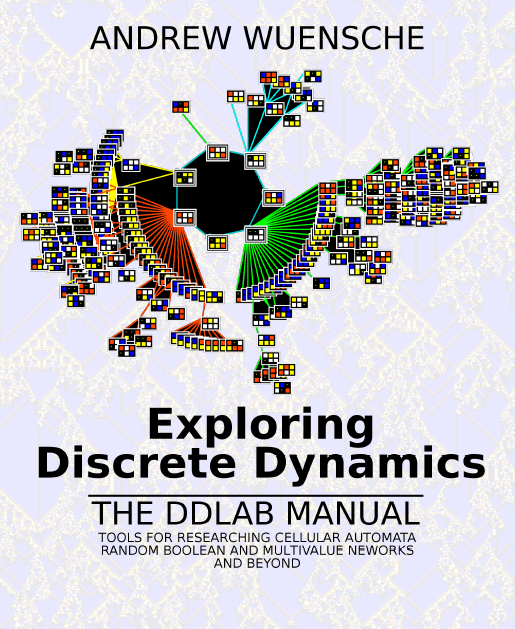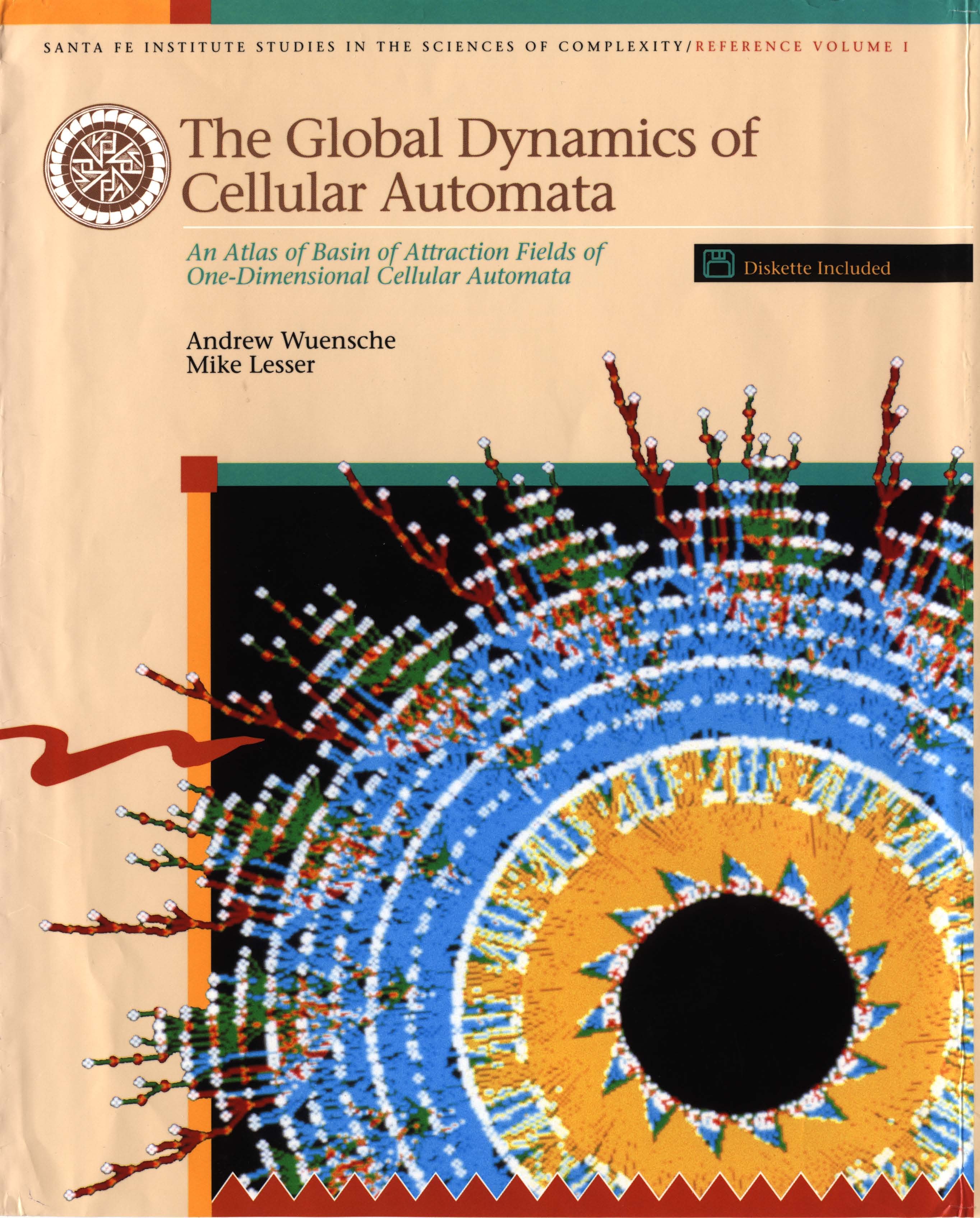
from Cellular Automata to Random Networks
Workshop/tutorial
at
ECAL 2011
Cite Internationale Universitaire de Paris,
Sats, Salle Satsuma, Maison Internationale, level 3 west
August 12, 13:30 to 17:00

|
from Cellular Automata to Random Networks
Workshop/tutorial
at
ECAL 2011 |
Discrete dynamical networks, which include cellular automata and
random Boolean networks, are at the very core of complexity and
emergent self-organisation, and provided the inspiration for
the founding ideas of Artificial Life, notably by Chris Langton.
Discrete Dynamics Lab (DDLab) is
open source interactive graphics software able to explore a huge
diversity of behaviour, space-time patterns, and basins of
attraction representing the convergent flow in state-space.
The latest version of DDLab is documented in the book
"Exploring Discrete Dynamics"
which is just been published.
Both book and software are available below, and at
www.ddlab.org where more info may be found.
The workshop will include a tutorial to demonstrate DDLab, a chance to
try out your own experiments -- bring your laptop with DDLab installed,
and an opportunity
for a 10 minute presentation of your work involving DDLab -- submit an
abstract ASAP but not later than July 27.
Subsequently, selected papers will be published in a special issue of the
JCA (Journal of Cellular Automata).
Andrew Wuensche (contact: andy AT ddlab DOT org) -
www.ddlab.org
13.30 -- 14.30
-- starting DDLab -- CA, RBN, DDN and hybrid networks
-- value range -- network size -- neighborhood
-- network geometry -- wiring -- rules and rulemix
-- network architecture -- network graph
-- initial state -- space-time patterns, 1d/2d/3d
-- basins of attraction and subtrees (running backward) -- learning
-- presentation options -- measures, parameters and data -- filing
-- attractor jump graph -- chain rules and encryption
-- classifying CA rule space -- vector PostScript graphics
-- source code and algorithms --
14.30 -- 15.00
15.00 -- 15.30
15.30 -- 17.00
"There is a whole universe of complexity that is captured by discrete
dynamical systems, which have been widely used as a powerful framework
to understand reality from different perspectives. Exploring Discrete
Dynamics is a great example of how to dive in this neverending universe.
A careful, compelling and detailed presentation of examples and methods
will help both beginners and scholars to get into this fascinating field."
Andy Adamatzky
Genaro Juarez Martinez
Workshop Program
tutorial/demo showing how to use DDLab and its range of functions,
referring to "Exploring Discrete Dynamics" -- the DDlab manual,
and including the following topics:
questions, discussions, wish-lists.
coffee break.
short presentations, discussions, and hands on experiments with
personal laptops or with the overhead projector laptop.
Advance Praise for EXPORING DISCRETE DYNAMICS

front cover
"Exploring Discrete Dynamics"
is published by Luniver Press (538 pages, 8×10in paperback) -- listed on most book sites:
e.g.
Amazon,
Book Depository etc., and also fully accessible on
Google Books.
Exploring Discrete Dynamics supersedes previous versions of the DDLab manual.
DDLab is free (open source) software under the GNU General Public License.
The latest code, compiled versions, and
Exploring Discrete Dynamics -- (hyperref-pdf with color figures), can be downloaded below.
downloads - www.ddlab.org
from the back cover
EXPLORING DISCRETE DYNAMICS is a comprehensive guide to studying
cellular automata and discrete dynamical networks with the classic
software Discrete Dynamics Laboratory (DDLab), widely used in research
and education. These collective networks are at the core of complexity
and emergent self-organisation. With interactive graphics, DDLab is
able to explore a huge diversity of behaviour, mostly terra incognita
-- space-time patterns, and basins of attraction -- mathematical objects
representing the convergent flow in state-space. Applications range
within physics, mathematics, biology, cognition, society, economics
and computation, and more specifically in neural and genetic networks,
artificial life, and theories of memory.
"Andrew Wuensche has, in an important sense, done more than anyone
to enable the study of discrete dynamical systems such as cellular
automata and random Boolean nets. Wuensche derived the mathematical
means to compute the "predecessor" states that flow to a successor
state. Thereby he opened the door to study the entire state space flow
of discrete dynamical systems. DDLab is a marvellous and useful tool
for all of us fascinated by discrete dynamical systems and what they
may tell us of mathematics and the world."
STUART KAUFFMAN, author of "The Origins of Order",
MacArthur Fellow, FRSC, University of Vermont, USA.
Tampere University of Technology, Finland.
RICARD SOLE, Author of "Signs of Life",
Complex Systems Lab, Universitat Pompeu Fabra, Barcelona.
Related Publications
books and papers can be found at
www.ddlab.org -- most are available in pdf.
